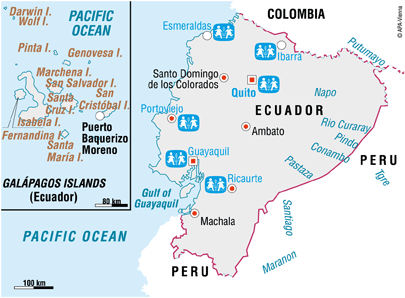
SOS relies on the kindness and generosity of Canadians to be able to provide a home for the most vulnerable children of around the world.
By becoming a child sponsor you are helping an individual child in need.
(You will receive a Canadian charitable tax receipt)
Please help us ensure a loving home for every child. Sponsor a child in Ecuador now.
SOS Children's Villages in Portoviejo
Manabí province in Ecuador has always been one of the poorest in the country. On the outskirts of Portoviejo, many families are struggling to survive on the little money they make as subsistence farmers. For many years, SOS Children's Villages has been working to support the children of the region and their families.
SOS Children's Village Portoviejo was set up in 1999. It is the sixth SOS Children's Village in Ecuador and includes an SOS Social Centre which offers family strengthening programmes that aim to strengthen existing family ties so that children can grow up in their own loving family. Through our SOS Social Centre, mothers are being given the opportunity to leave their children in our day-care centre so that they can go to work.

We support families and communities by focusing on their economic autonomy and self-reliance, trying to prevent family break-ups that happen as a result of poverty or dysfunctional family structures. Furthermore, counselling and psychological support is being offered to the local population.
Children whose families cannot take care of them will find a loving home in one of the 12 SOS families, where they live with their brothers and sisters. In Portoviejo, up to 108 children can be cared for by the SOS mothers. SOS Children's Village Portoviejo also includes an SOS Youth Programme where young adults are given the opportunity to live in a house while they attend vocational training or go on to higher education. With the support of qualified youth workers, the young people develop perspectives for their future, learn to shoulder responsibility and increasingly make their own decisions.
In Portoviejo, many children work instead of going to school
The city of Portoviejo is the capital of Manabí province, located in the north-west of Ecuador. Manabí has historically been marked by high levels of poverty that are clearly above the Ecuadorian average. In no other coastal province of Ecuador is malnutrition more pronounced than in Manabí. Only eight out of 22 districts match the Ecuadorian average in terms of malnutrition figures.
In rural areas, people largely depend on livestock and subsistence farming. Thousands of families lack access to drinking water, paved roads, sewage systems and even electricity. The problems they face throughout their lives are numerous and severe. Since agriculture remains the most important source of income for many families in the Manabí region, children often work in the fields and are thus exposed to dangerous machinery and pesticides. Instead of going to school, many of these children work up to ten hours a day in an environment that may have negative effects on their mental and physical development.
Nearly half of all young people in Manabí live below the national poverty line. Although the Ecuadorian government has introduced a very progressive social agenda that focuses on the alleviation of poverty, child malnutrition remains particularly widespread in the region. Access to education generally exists in the city of Portoviejo itself. However, many families who live in smaller towns nearby find it difficult to get their children to school. Covering the costs of transportation and school material is often beyond their means. In Manabí, around 65,000 children grow up without their parents.
Thousands depended on nutritional support as a result of devastating droughts in 2010
SOS Children's Village in Manabí was founded in order to help the region's vulnerable children, young people and families. As Manabí remains one of Ecuador's least developed areas, our work there has been particularly important. 26 per cent of women in Manabí are illiterate, as access to education continues to be a luxury available only to a very limited number of people. According to public health experts, malnutrition is by far the biggest contributor to child mortality in many developing countries. In fact, it has been reported that it causes more than half of all deaths in children worldwide. In some districts of Manabí, around 40 per cent of children are chronically undernourished.
In 2010, a bitter drought further aggravated their situation and tens of thousands of children found themselves on the brink of starvation. In these harsh socioeconomic conditions, orphaned and abandoned children are particularly vulnerable. Therefore, SOS Children's Villages intensified its efforts in the region to help the people in need.
Our Impact
Image

SOS Social Centres in Ecuador aim is to help families, in particular women and children, living in communities neighbouring the SOS Children's Villages to gradually escape from poverty, and to help young people become self-reliant. |
2 SOCIAL CENTRES | 599 Beneficiaries |
Image
The SOS Children's Village in Ecuador provides loving homes to orphaned and abandoned children |
1 VILLAGES | 82 Orphaned and Abandoned Children |
Image
The SOS Youth Facilities in Ecuador provides youth with a loving environment where they learn to transition into independent living and to expand their education |
1 YOUTH FACILITIES | 39 Youths in our Care |
Our Impact

